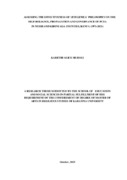| dc.description.abstract | The call for moratorium on foreign missionaries and subsequent adoption of
‘Jitegemea’ (self-sustaining) philosophy in the Presbyterian Church of East Africa
(PCEA) provoked a strong debate about the future of the church and her ability to
develop without external support. However, limited research has examined the
effectiveness of the ‘Jitegemea’ philosophy on the development of the church, fifty
years later. This study assessed the effectiveness of Jitegemea philosophy on the
attainment of the goals of PCEA in Nyeri and Kirinyaga counties which form the
Kirimara West Presbytery. The specific objectives were: to explore factors leading to
the call for moratorium on foreign missionary activities in the PCEA; analyze the
positive outcomes of adopting the ‘Jitegemea’ philosophy on the spiritual, social and
economic functions of PCEA; examine the challenges experienced by the PCEA since
the moratorium; and assess the extent to which the PCEA in Nyeri and Kirinyaga
counties has achieved the goal of self-sustenance. Henry Venn’s theory of a self supporting, self-governing and self-propagating church guided the study. A descriptive
survey research design was adopted and targeted 13,180 ordinary members, 418 elders
and 13 Parish ministers. A sample size of 100 respondents from ordinary church
members who were selected using Yamanne’s formula of 10% participated in the study.
In addition, 20% of the 418 church elders were selected to give a sample of 84 elders.
One parish minister from each of the 11 parishes was purposively selected for the study,
giving a sample of 11 ministers. Data from the ordinary church members and elders
was collected using questionnaires. An interview guide was used to collect data from
the parish ministers. To test for validity and reliability of the data collection
instruments, a pilot study was conducted in two parishes in the neighboring Murang’a
County. Cronbach’s Alpha was used to determine the internal consistency of the
questionnaires and a coefficient of 0.705 was achieved, indicating that the instruments
were reliable. Ethical considerations of anonymity, confidentiality and informed
consent were strictly adhered to. After collection, quantitative data was analyzed
descriptively using percentages and frequencies. Data presentation was done in form of
tables, bar graphs and pie charts. Qualitative data was analyzed using the thematic
approach to enrich the quantitative results. The study found out that the call for
moratorium on foreign mission activities was a strategy to allow the PCEA churches to
be self-reliant and embrace total responsibility for the work of the church and its
mission activities. Among the positive outcomes of adopting the ‘Jitegemea’
philosophy were improved financial freedom, increased church membership and gender
equality in service. However, inadequate resources slowed the achievement of the
PCEA goal of self-reliance, self-governance and self-propagation despite the effort
made. Despite the challenges members of the PCEA still believe that it is necessary for
the church to be self-reliant in its activities. The study recommends regular training on
how to carry out mission work and evangelization, proper planning of church projects
to save on funds and formulation of policies to guide decision making in church
governance. The study findings are expected to add on to the existing literature on the
‘Jitegemea’ philosophy and may provide valuable lessons to policy makers, church
leaders, Christians and other stake holders on church development and project
sustainability. | en_US |
